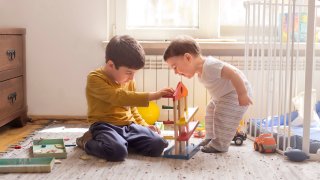
Apologies, whether public or private, can be easy to mess up.
When Marjorie Ingall and Susan McCarthy decided to write "Sorry, Sorry, Sorry: The Case For Good Apologies," they wanted to figure out why.
The two journalists were fascinated by how difficult it is to formulate a sincere — or at least sincere-sounding — apology.
Ingall also had a personal stake in finding out how to teach kids to say "sorry."
Get Boston local news, weather forecasts, lifestyle and entertainment stories to your inbox. Sign up for NBC Boston’s newsletters.
"I had a baby who was the most fierce, feral toddler," she said. "She spent a lot of time in the consequence chair."
One potential reason we're so bad at saying "sorry," Ingall said, is that good apologies weren't modeled for us growing up.
"Most of us are familiar with the phenomena of watching our parents fight and thinking, 'Oh, no, this is terrible,' and then the next morning everything is fine again," she said.
Money Report
To be good at apologizing as an adult, you have to witness it and learn how to do it as a kid, she said.
"It's a muscle you develop," she said. "No one is going to be great at it right out of the gate."
There are steps that can make this easier.
6 steps to a good apology
The main thing to remember about saying sorry is to take responsibility: "A good apology takes ownership," Ingall said.
She and McCarthy endorse the following format:
- Say the words "I'm sorry."
- Say what you did.
- Show you understand why it was bad.
- Explain if you need to, but don't make excuses.
- Explain how it won't happen again.
- Offer reparations, if appropriate.
If your child threw food at a classmate, their apology should sound like this:
"I'm sorry for throwing food. I understand that wasn't nice and I won't do it again."
There is also a half step that Ingall calls "listen," where your kid is open to hearing the other person's response, if they have one.
After your child goes through these steps, it's important that you recognize how challenging that was.
Say, "thank you, that was hard," Ingall said.
While there can still be consequences for the child's actions, the apology itself should be appreciated.
"You don't want to make the connection in the kid's mind that apology means punishment," she said.
Kids shouldn't have 'free will' about apologizing
Ingall notes that whether your child is contrite doesn't matter. Because many times, they won't be.
"When you are teaching kids to apologize, I don't believe they should have free will about it," she said.
Although you eventually want your child to understand that what they did is harmful to themselves or to others, the goal when they are younger is to teach them the "how," not the "why."
"In the beginning all you want to get from them is 'I'm sorry,'" she said.
DON'T MISS: Want to be smarter and more successful with your money, work & life? Sign up for our new newsletter!
Take this survey and tell us how you want to take your money and career to the next level.






